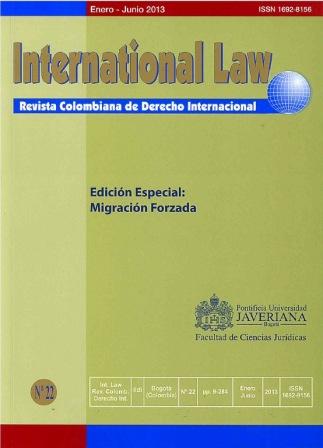Abstract
Environmental degradation and the effects of climate change have direct and indirect impacts on the effective enjoyment of human rights. Countries where the effects of environmental change and degradation occur are mostly likely to be vulnerable to human displacement, due to the lack of available adaptation resources, poor human resource implementation capacity and often a deficient human rights protection record. Such countries are also the ones least likely to proactively lobby governments at the national and international levels. While the exact number of people displaced is hard to estimate predictions are of approximately 150 million of environmentally displaced persons by 2050. This analysis starts by portraying the human impacts of environmental change, and then concentrates on the home states obligations under international human rights standards in parallel scrutiny with regional and international jurisprudence. The aim is to establish which duties home states have with regards to respecting human rights and ensuring a healthy and safe environment by avoiding environmental degradation. A further aim is to establish how states duties are transferable in the environmental change context; in particular, what protecting obligations states have towards environmentally displaced persons. This paper explores the duty of states to protect environmentally displaced people through a dynamic model of internalisation of protection obligations: respecting and fulfilling people’s needs in an interactive, international assistance, cooperative and participatory process. Ultimately, the global polity of states must find ways to deal with new legislative challenges in this current world of permanent emergencies of natural and human made environmental degradation and change.
This journal is registered under a Creative Commons Attribution 4.0 International Public License. Thus, this work may be reproduced, distributed, and publicly shared in digital format, as long as the names of the authors and Pontificia Universidad Javeriana are acknowledged. Others are allowed to quote, adapt, transform, auto-archive, republish, and create based on this material, for any purpose (even commercial ones), provided the authorship is duly acknowledged, a link to the original work is provided, and it is specified if changes have been made. Pontificia Universidad Javeriana does not hold the rights of published works and the authors are solely responsible for the contents of their works; they keep the moral, intellectual, privacy, and publicity rights.
Approving the intervention of the work (review, copy-editing, translation, layout) and the following outreach, are granted through an use license and not through an assignment of rights. This means the journal and Pontificia Universidad Javeriana cannot be held responsible for any ethical malpractice by the authors. As a consequence of the protection granted by the use license, the journal is not required to publish recantations or modify information already published, unless the errata stems from the editorial management process. Publishing contents in this journal does not generate royalties for contributors.


